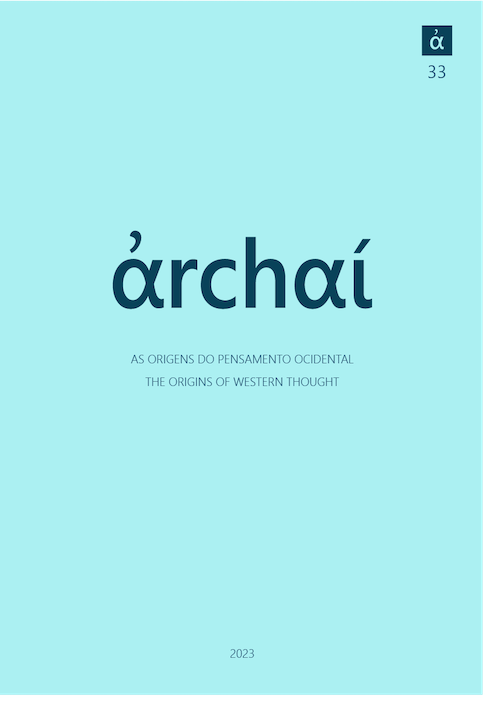Embryon and kyema on Aristotle’s Biological Works
DOI:
https://doi.org/10.14195/1984-249X_33_18Keywords:
Aristotle, biology, embryon, gestation, kyemaAbstract
Although there are those who understand that the debates about the morality of the interruption of pregnancy are newly born, when analyzing some passages of the classical sources, the antiquity of such discussions is revealed. Likewise, as the legal, political and moral conclusions in such respects are often based on a metaphysical, anthropological, theological or biological position, it is necessary to enter these fields in order to fully explore the different edges of such a complicated object. In this way, this work aims to show the terminological pitfalls that the words embryon and kyema generate for the understanding of Aristotelian embryology, which is the basis for understanding his position on abortion, as well as the scholastic debates that use this as a source. We aspire to analyze the various appearances of both terms in various works of Aristotle - fundamentally De generatione animalium and De partibus animalium - and show how there is no criterion to distinguish them in most contexts.
Downloads
References
BALME, D. M. (1987). The Place of Biology in Aristotle’s Philosophy. En: GOTTHELF, A.; LENNOX, J. G. (Eds.). Philosophical Issues in Aristotle’s Biology Cambridge, Cambridge University Press, p. 9-20.
BARTOLOMÉ, R.; MARCOS, A. (2010). Aristóteles. Obra biológica Madrid, Luarna.
BERNABÉ PAJARES, A.; LA CROCE, E. (1987). Aristóteles. Acerca de la generación y la corrupción - Tratados breves de historia natural Madrid, Gredos.
CALVO MARTÍNEZ, T. (1994). Aristóteles. Metafísica Madrid, Gredos .
DÜRING, I. (1966). Aristoteles. Darstellung und Interpretation seines Denkens. Heidelberg, Universitätsverlag Carl Winter.
GARCÍA YEBRA, V. (1998), Aristóteles. Metafísica (edición trilingüe). Madrid, Gredos .
GELBER, J. (2017). Females in Aristotle’s Embryology. En FALCÓN, A.; LAFEBRE, D. (2017). Aristotle’s Generation of Animals, A Critical guide, Cambridge, Cambridge University Press p. 171-187.
GOTTHELF, A; LENNOX, J. G. (1987). Biology and Philosophy: an Overview. En: GOTTHELF, A. y LENNOX, J. G. (Eds.). Philosophical Issues in Aristotle’s Biology . Cambridge, Cambridge University Press , p. 5-8
LIDDELL, H. G.; SCOTT, R. (1925). Greek-English Lexicon [1ed. 1843]. Oxford, Clarendon Press.
LÓPEZ DE CASTRO, J. M. (2003), Giovanni Reale. Guía de lectura de la “Metafísica” de Aristóteles”. Barcelona, Herder.
MANULI, P.; VEGETTI, M. (1997). Cuore sangue cervello. Biologia e antropologia nel pensiero antico Milan, Episteme.
MATTHEN, M. (2011). The Four Causes in Aristotle’s Embryology. Apeiron, a Journal for Ancient Phylosophy and Science 22, n. I.2, p. 160-179.
PELLEGRIN, P. (1982). La classification des animaux chez Aristote. Statut de la biologie et unite de I'aristotelisme Paris, Les Belles Lettres.
PRÓ, F. D. (1981), Ross, W. D. Aristóteles Buenos Aires, Charcas.
SÁNCHEZ, E. (1994), Aristóteles. Reproducción de los animales Madrid, Gredos .
TIPTON, J. A. (2014). Philosophical Biology in Aristotle’s Parts of Animals. Springer, New York.
TREDENNICK, H. (1989) Aristotle. Aristotle in 23 Volumes, Vols. 17, 18. London, Willian Heinemann.
VEGETTI, M. (1981), Los orígenes de la racionalidad científica, Barcelona, Peninsula.
VEGETTI, M. (1997). Biologia. En: BERTI, E. (ed.), Guida ad Aristotele. Roma, Laterza.
Downloads
Published
How to Cite
Issue
Section
License
Copyright (c) 2023 Francisco Iversen

This work is licensed under a Creative Commons Attribution 4.0 International License.
Given the public access policy of the journal, the use of the published texts is free, with the obligation of recognizing the original authorship and the first publication in this journal. The authors of the published contributions are entirely and exclusively responsible for their contents.
1. The authors authorize the publication of the article in this journal.
2. The authors guarantee that the contribution is original, and take full responsibility for its content in case of impugnation by third parties.
3. The authors guarantee that the contribution is not under evaluation in another journal.
4. The authors keep the copyright and convey to the journal the right of first publication, the work being licensed under a Creative Commons Attribution License-BY.
5. The authors are allowed and stimulated to publicize and distribute their work on-line after the publication in the journal.
6. The authors of the approved works authorize the journal to distribute their content, after publication, for reproduction in content indexes, virtual libraries and similars.
7. The editors reserve the right to make adjustments to the text and to adequate the article to the editorial rules of the journal.



